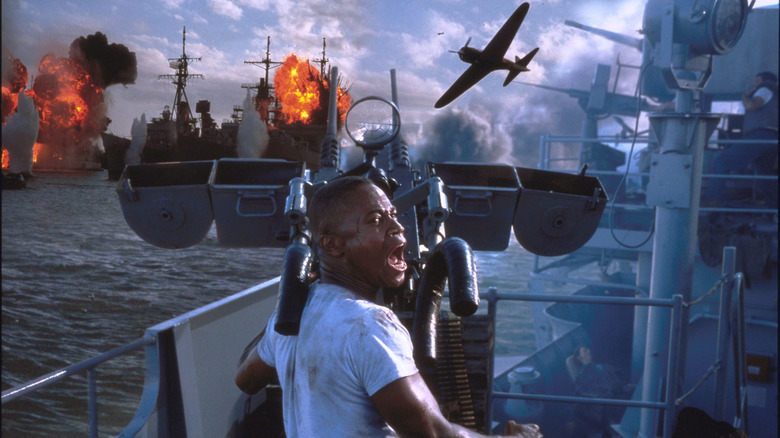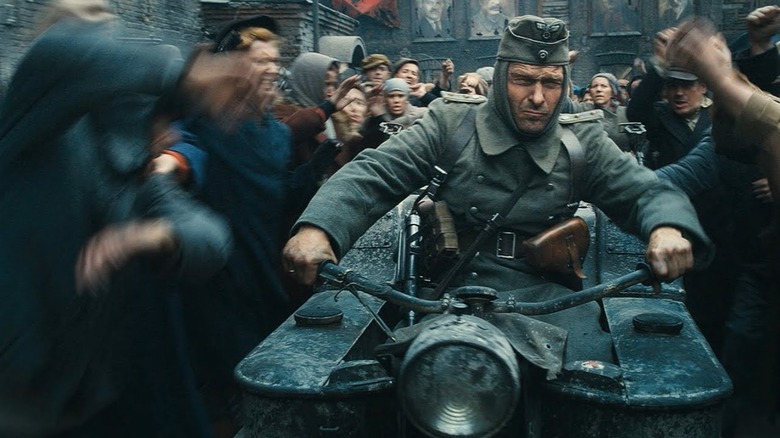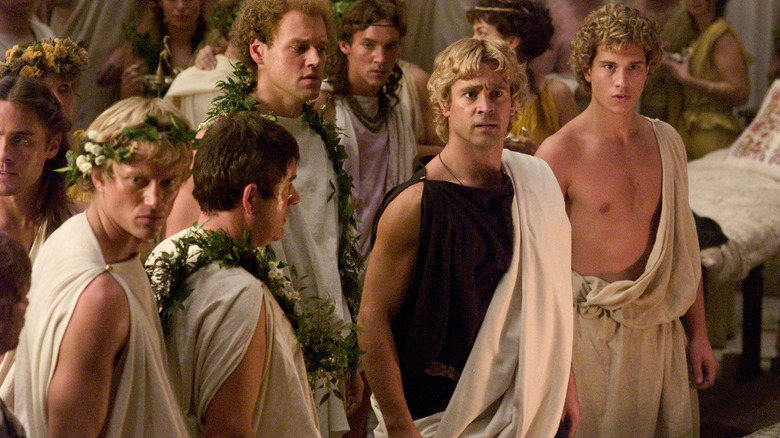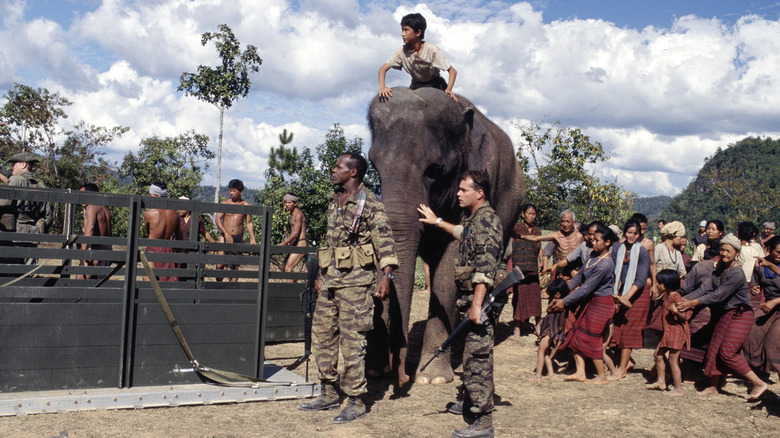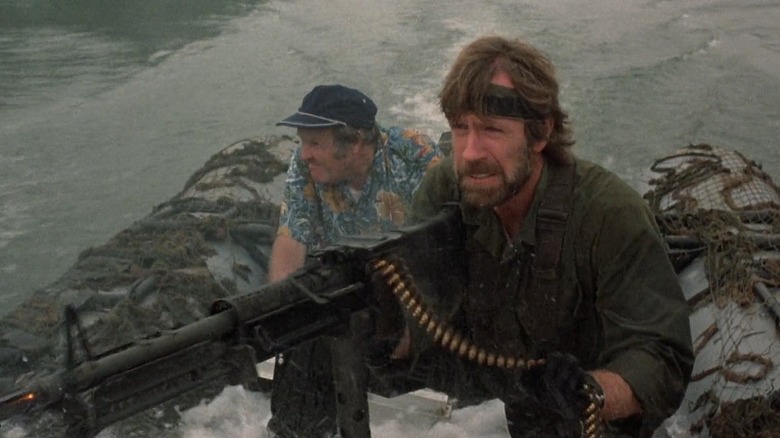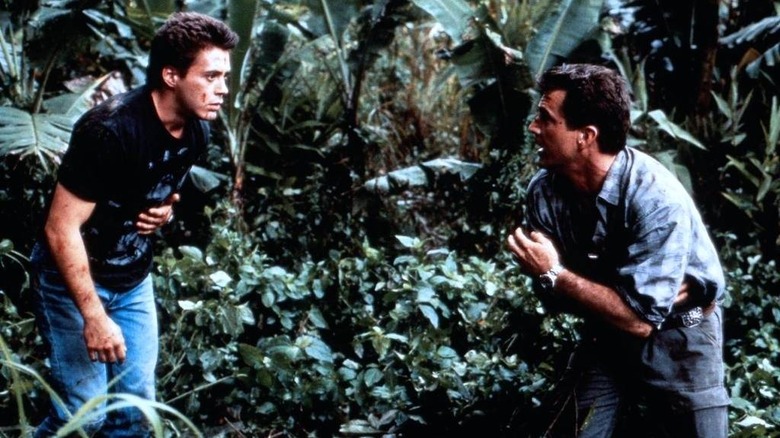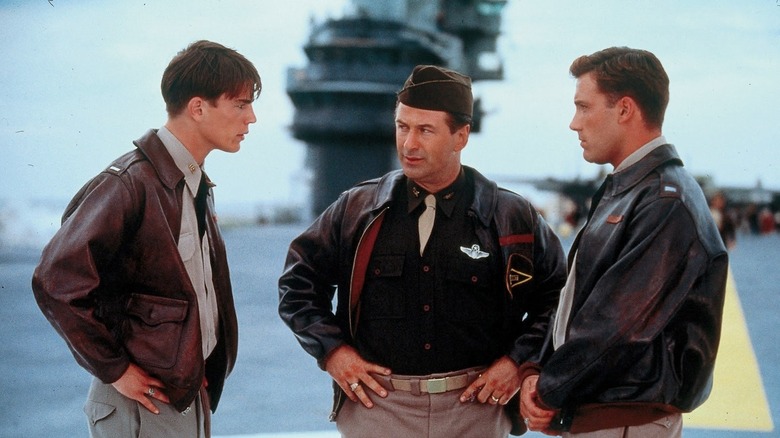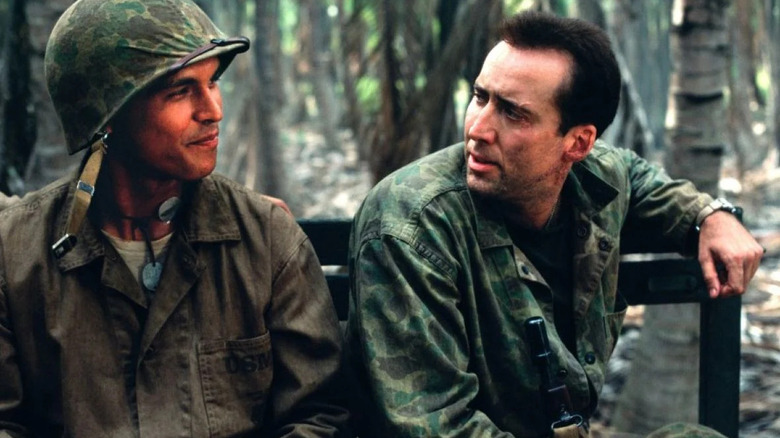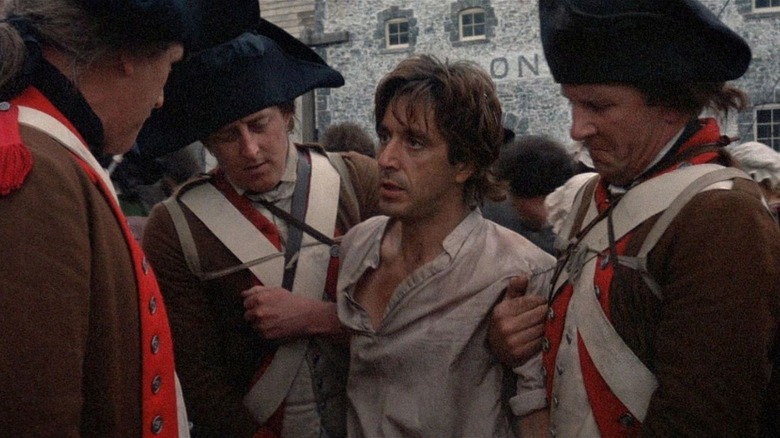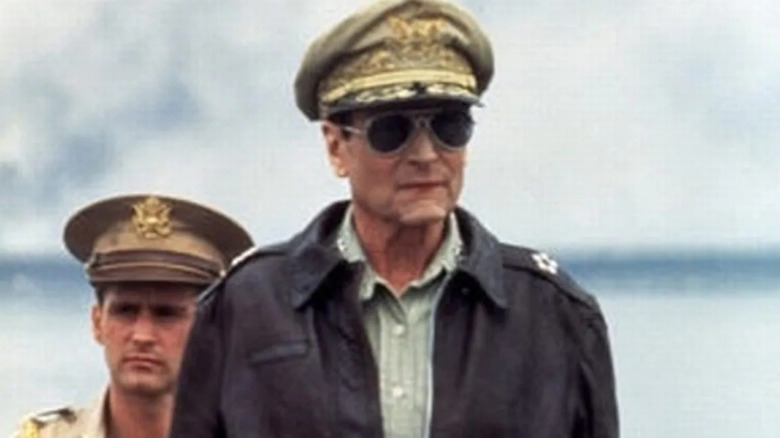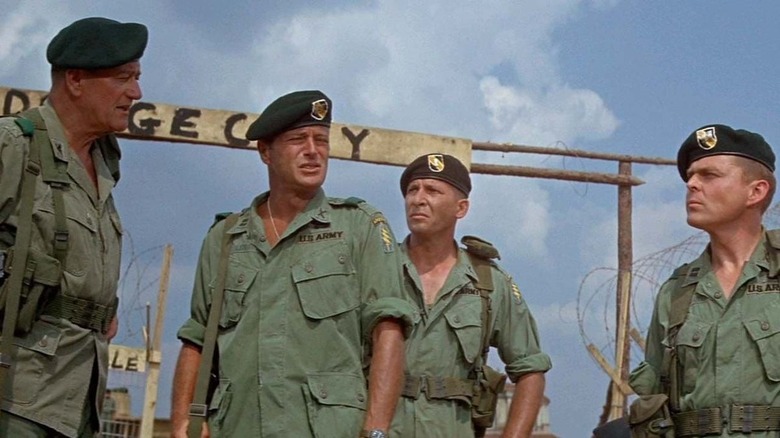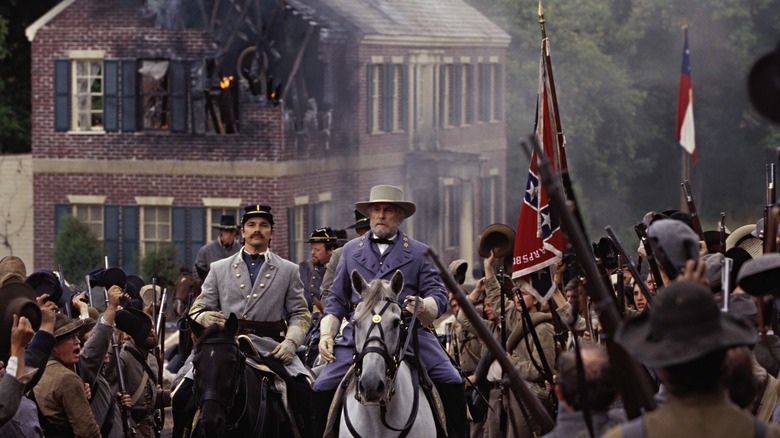The Worst War Movies Ever Made
War is hell, but war movies, when done right, can make us cry, cheer, and think as well as films in any other genre. "Saving Private Ryan" changed movies forever with its unflinchingly authentic depiction of combat. "Come and See" will devastate you in all sorts of thought-provoking ways. "Glory" will move you to tears.
But of course, they're easy to screw up, too. For every "Das Boot," "The Bridge on River Kwai," or "Platoon," there are countless schlocky, skippable dumps filling those "5 EXPLOSIVE ACTION THRILLERS" DVDs in the back of Goodwill. It really is a minefield out there for war movies. Some bad ones are tastelessly gory. Others rely too heavily on CGI or eye-roll-inducing clichés, like when characters snap your suspension of disbelief by telegraphing their looming deaths via predictable redemption arcs or talking about marriage plans. And some war movies fail because they can't think outside the box when it comes to characters, relying on stock blueprints like the kid from Brooklyn, the token Black guy, the angry sarge, and so on.
So which lousy war flicks stand out even amongst all the shlock for all the wrong reasons? Get ready to not be moved to tears for 30 minutes before changing the channel. These are the worst war movies ever filmed.
Stalingrad (2013)
No, not the 1993 German version, which is one of the finest war movies ever made. We're talking about the 2013 Russian version. The fight for Stalingrad (now Volgograd) was the largest and deadliest battle in human history, and the upset Soviet victory turned the tide of World War II in Europe. It makes perfect sense for Russia to celebrate the veterans of its greatest battle, but it's a travesty that this film is the best they could do.
The German version — to which the Russian version is doomed to be compared for as long as people remember it — is complex, haunting, and unforgettable. This version is a CGI schlockfest where nothing is said about the battle, the human condition, or the impacts inflicted by a war this horrid on those who endured it. Instead, we're forced to suffer through scene after scene of mind-numbing action and stock characters. In typical bad war movie fashion (as was the case in "Pearl Harbor" and fellow Stalingrad movie "Enemy at the Gates"), the centerpiece is a melodramatic love story that is out of place and unwelcome. In fact, its very inclusion is proof that the filmmakers were scrambling for ideas to fill the run time. Perhaps that explains all the overused slow-mo.
The movie is undeniably well made from a production standpoint. It looks great, and the acting is fine. But it's an insufficient tribute to the men who fought, died, and arguably saved civilization in the actual battle.
Alexander
"The Lord of the Rings" proved there was a widespread public appetite for swords and sandals adventure/war epics In the early 2000s. For the next few years, audiences got several overly long, medieval/ancient war films that took themselves very seriously even though the action — not the characters, writing, or themes — was clearly the draw. "Troy" and "Kingdom of Heaven" were two. "Alexander" was another. None were great, but the third is the worst.
Colin Farrell stars here as Alexander the Great. But even after three hours of watching people in togas talk, ponder, pontificate, discuss, debate, and parley, you'll realize you still know frustratingly little about the legendary Macedonian conqueror. Most egregiously, the film doesn't bother to separate myth from fact since the framing device here is Ptolemy narrating the film like a bedtime story rather than an examination of the historical record. And although Alexander's sexuality is examined, the film isn't bold enough to make a definitive statement on the matter. Sure, some of the battle scenes were lightly praised by historians, but they're not enough to salvage this tedious, melodramatic flop.
"Alexander" largely fails because it makes a critical mistake that other biopics have wisely avoided. "Lincoln" and "Downfall" work so well because they choose to focus on a small span of time in the life of the subject. "Alexander" tries to examine the titular king's entire eventful life in the span of barely three hours. It's not nearly enough time, and as a result, isn't short enough. Now that takes some doing.
Operation Dumbo Drop
The Vietnam War rages. To punish a local village for harboring U.S. troops, the Vietcong slaughters the village's elephant in the lead-up to an important spiritual festival. To win back the people's loyalties, American Green Berets promise to replace the beast. Danny Glover and Ray Liotta star in this — wait, that can't be right — family comedy from Disney? No.
Yes. Walt Disney's "Operation Dumbo Drop" chose the Vietnam War as the setting for a PG-rated comedy. That's not to say the movie is all gags and slapstick — it is based on a true story and does try to focus on deeper themes like war, animal welfare, and politics. But while this approach is more respectful, it doesn't help. Neither do admittedly strong performances and competent direction. The fact you simply cannot ignore while watching this confusing film is that the Vietnam War was a savage, complicated conflict that a children's movie — even one starring a lovable elephant — simply cannot contain. Who is it even for? The sanitized silliness involved with transporting an elephant in the jungle makes this an unlikely film for adults, and kids young enough to enjoy that part won't understand the historical context.
The film serves as an interesting cautionary tale about the importance of tone and genre. The story itself isn't bad, and it is told as well as the parameters of family comedy films allow. But it still fails because the genre and premise had no business being combined.
Missing in Action
Film actor Chuck Norris is famous for everything except the films he acts in because they don't tend to be very good. Case in point: "Missing in Action," which follows Colonel James Braddock in an attempt to rescue his men, who are still being held at the POW camp he spent seven years in. That premise could be the cornerstone of a serviceable B movie. It could also describe a shlocky shoot-'em-up with 10 explosions a minute and hordes of enemies almost as uninteresting as the leads themselves. Judging by its inclusion on this list, we're sure you can figure out which one it is.
The movie was slammed not just for its lazy, predictable script but for being a rip-off of the "Rambo" movies. How sad is that? Even those weren't very good. "Rambo: First Blood Part II" won Worst Picture and Worst Actor at the Razzies, for crying out loud. Still, the appeal is obvious, and it's not exactly a mystery why '80s action flicks would want to cash in on the "tough guy blows Communists away in the jungle" craze.
Chuck Norris himself is the best part of this shlocky, xenophobic mess of a movie. That's not saying much, but at least he brings some physicality to the proceedings and sees his Braddock character get a little development before it's all said and done. Tragically, but predictably, the movie got a 1985 prequel and a 1988 sequel. Both of which also sucked. Next.
Air America
"Air America" is an action/comedy about two Vietnam War pilots — played by Mel Gibson and Robert Downey Jr. — who discover their aircraft is being used by government agents to smuggle heroin, and who go to great lengths to avoid being seen as criminals themselves. It was marketed as a light-hearted buddy film, but it tried to be something else entirely. It succeeded as neither.
It's worth noting that Air America was a real thing. Specifically, an airline that was covertly owned and used by the CIA. During the Vietnam War, it ran several covert operations to help troops in the field. This movie's attempts to demonize the organization didn't go over well with everyone. But real Air America supporters can take some small comfort in the fact that the movie fell short in every respect. It wasn't funny enough to be a comedy. The action scenes were nothing to write home about. As a vehicle to show off the talents of its leads, well, it doesn't. The movie, as mentioned earlier, was marketed as a goofy buddy cop flick but genuinely tried to subvert audience expectations with an anti-war message uncharacteristic of the genre. This is respectable in theory, but it failed utterly in this instance.
Some of the flying stunts weren't half bad, though. We suppose that's something.
Pearl Harbor
It's likely that the movie "Pearl Harbor," the second-worst thing you associate with that name, happened because director Michael Bay saw "Titanic" and reasoned that if you smash a love story peg into a major historical event hole, you get paid. "Pearl Harbor" is, of course, about the infamous Japanese raid on December 7, 1941. Apparently, the Japanese characters are aware they're going to lose the war, or perhaps that they're villains in someone else's movie. Because despite the success of their attack, they can't be bothered to celebrate or do anything but say things like, "I fear all we have done is to awaken a sleeping giant."
The Americans we're following are busy with a banal love triangle, complete with all the "I don't like sand" level dialogue you would expect. "I'm gonna give Danny my whole heart," says Evelyn (Kate Beckinsale) to Rafe (Ben Affleck). "But I don't think I'll ever look at another sunset without thinking of you." Barf. This comes after a scene subtitled "three months later," in which Rafe says, "Don't let it be three months before I see you again, okay?" Apparently, you really need to know it's been three months.
The attack scene itself isn't without well-composed shots. One of a kid pausing a ballgame to gawk at incoming Japanese planes is memorable. But war movies don't get special credit for doing their job. And largely, this one doesn't. Bay revels in carnage, but not in anything approaching wit.
Windtalkers
The story of the Navajo code talkers — real-life Native Americans who used their language to produce an unbreakable secret code during World War II — deserves to be told. But not like this. John Woo's "Windtalkers" is allegedly about them, but they're benched as side characters so that the film can instead focus on Marine Sergeant Joe Enders — a white character played by Nicolas Cage — who is tasked with babysitting them during 1944's Battle of Saipan. He initially resents this assignment but eventually bonds with the men and sacrifices himself to ensure their safety.
Enders, who was traumatized during the Solomon Islands campaign after a Japanese ambush killed his men and wounded him, could have been an intriguing character. But a flat, uninspired script holds Cage back. One of the film's hooks is that he has been ordered to kill the Navajo if their capture by Japanese forces appears imminent to prevent their code from falling into enemy hands. This could have really been something, but again, director John Woo fails to make it so. American audiences could have learned about the Navajo contributions to our war effort and perhaps a thing or two about their culture, but this opportunity is never seized.
At every turn, "Windtalkers" chooses to cower in the foxhole of safe war movie clichés rather than take risks and tell an impactful story. The result is a dud.
Revolution
Mel Gibson's "The Patriot" is infamous for its inaccuracies, but it's got nothing on "Revolution." Al Pacino stars here as Tom Dobb, a fur trapper in New York who becomes involved with the Patriots after his son is captured by British troops. This historic box office bomb was so poorly received that Al Pacino took a four-year hiatus from acting. First of all, the movie unwisely chooses to focus on the entire conflict, from 1775 to 1783. That much breadth can only be depicted by sacrificing depth, and this movie isn't deep enough to get your ankles wet.
Characters who meet only briefly at the beginning of the film are given tearful reunions later that are clearly not earned. No one seems to grasp the gravity of the events. Battles are seen through a choppy lens that robs viewers of their significance and place in the larger context of the war. Like "The Patriot," British soldiers are depicted as sadistic war criminals, despite no evidence existing to support this.
It's not just bad — it's confusing. You get the impression a more competent film is in here somewhere, but a disaster on the cutting room floor produced this instead, and the studio rushed it to theaters. Unsurprisingly, the Razzies had a field day, doling out four well-earned nominations, including those for Worst Picture and Worst actor (although "Rambo: First Blood Part II" took those). It's one of the most embarrassing things Al Pacino ever did, and that guy was in "Jack and Jill."
Inchon
The Korean War wasn't unlike World War I's Western front, in that there was a brief burst of action before everyone settled into trench warfare, and the front lines effectively stopped moving. In a nutshell, North Korean troops drove the South Koreans back before a U.S.-led coalition invaded Inchon and drove them back (before being driven back again by Chinese troops). Those landings were a shoo-in for a film depiction.
Unfortunately, 1981's "Inchon" was the best Hollywood could do to immortalize them. Directed by Terence Young and starring Laurence Olivier as General Douglas MacArthur, the movie looks like an overbudget made-for-TV B-movie. Olivier himself holds his own, but he's surrounded by supporting characters who are granted no depth whatsoever and given only the cheesiest lines to deliver. That's at least better than the zero lines afforded to the Communists, who are a faceless horde. Every scene feels like a riff on a shamefully simple formula: Here's a building or a bridge. Here's a big explosion that took it out. Throw in some screaming extras and do it a handful of times, and you've got yourself "Inchon."
A few more interesting facts: The movie cost $46,000,000 to make and lost almost all of it, becoming one of the biggest box office disasters in history. The script was written by Robin Moore, who wrote the novel "The Green Berets," which was turned into, wouldn't you know it, another one of the worst war films ever made. Small world, isn't it?
The Green Berets
Loosely based on the 1965 novel of the same name, "The Green Berets" is an American war film in the tradition of World War II-era Hollywood. Unfortunately, the movie isn't about the Second World War and wasn't released during it. It's about the ongoing Vietnam War, which drastically changed American sensibilities toward foreign conflicts into something much more complex than an old-fashioned "good versus evil" outlook. That nuance is lost on "The Green Berets," and the inclusion of John Wayne, who delights in shooting America's dirty enemies at least as much as anyone who actually has, should tell you what kind of movie this is.
You could make the argument that Wayne was not necessarily trying to market the cause but the bravery of special forces units. But that's not how the film comes across. The Berets themselves appear to be little more than a delivery mechanism for cowboys and Indians clichés, and the movie says nothing about Vietnam beyond Americans good, Communists bad. It reads like a parody of itself. It is filled with stock heroes, tropey plots that could've been set during any conflict (Capture their general! Defend the base!), and faceless villains who delight in committing atrocities because that's their job as bad guys with a funny accent. If only things were so simple. In one scene, Wayne says to a journalist, "Out here, due process is a bullet." As if that's something to be proud of, rather than something to grieve.
Gods and Generals
Unfortunately for fans of the superior "Gettysburg," the 2003 prequel "Gods and Generals," based on Jeff Shaara's novel of the same name, is a pompous slog filled with self-righteous monologuing by flat, one-dimensional characters. But there's something more sinister at work here than director Ron Maxwell's bland filmmaking: sympathy with the debunked tenants of the Lost Cause. This ideology and movement present the Confederacy as a noble rebellion against the godless hordes of the North, rather than what it was — a failed state run by and for wealthy plantation owners started specifically to preserve and expand the institution of slavery.
"Gods and Generals" is an astonishing film that obsesses over minute historical details, like the names and standards of each regiment and the placement of every button on every uniform, while at the same time intentionally misrepresenting the broader strokes of history to an appalling degree. Each of the film's three Black characters is nauseatingly loyal to their masters and distrustful of "Northern invaders," and the only racial slur comes out of the mouth of a Union soldier. In scene after scene, Confederate leaders wax lyrical about the Southern cause (states' rights and independence, of course, what's slavery?), while only a single scene is devoted to the Union perspective. Speaking of which, the Union army is depicted as the pillaging, plundering weapon of corrupt Northern war profiteers, while Southern rebels are noble freedom fighters defending home. Imagine how heads would roll if World War II were presented like this.
